Egg-bound chicken
Having an animal that is sick or injured can be a stressful time on a homestead, especially with chickens. Hens can be fragile so having tips on how to help if needed can be the difference between life and death. This article will walk you through the symptoms of an egg bound chicken so you can help her with support and care when needed.
Raising chickens that are healthy by being proactive will help you to more quickly catch issues so you can help or call for assistance when needed.
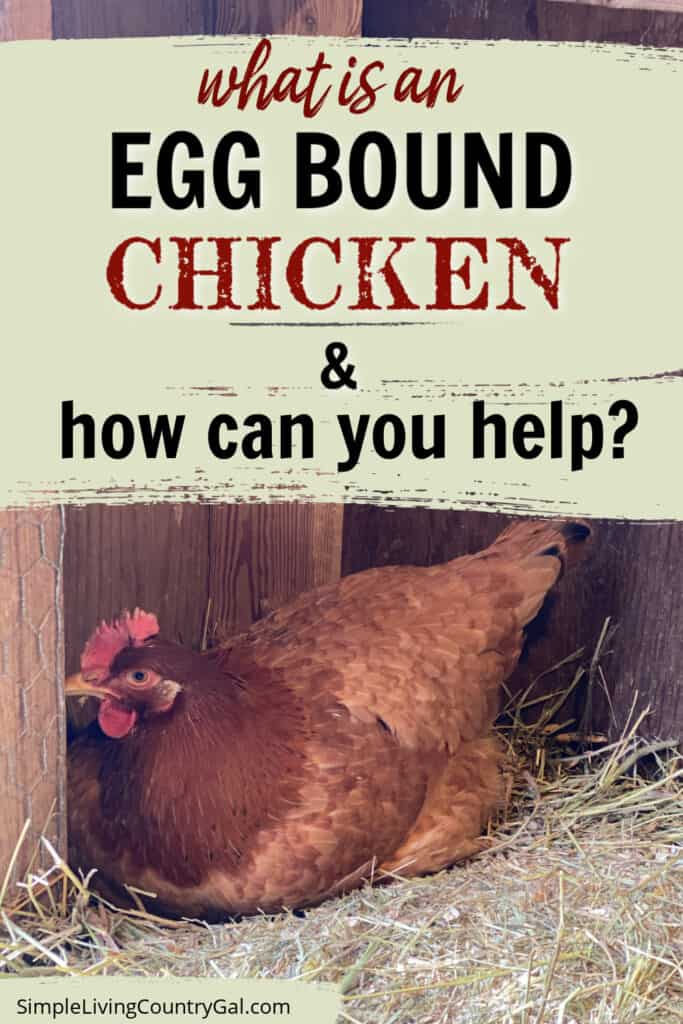
Years ago, I received valuable advice from a vet that has stayed with me all these years. He said, “It is better to invest in raising hardy animals than to wait until something goes wrong, causing you to spend a fortune to help.”
This is great advice to live by in most cases, but there are some instances when things go wrong, no matter what you do to prevent them.
One of those instances is an egg-bound chicken. If you suspect your hen is egg-bound, it can be stressful for you and your hen. The good news is that you can help and maybe even save your bird’s life with some useful tips. Easy things that can help your chicken pass her egg and remain a thriving member of your flock.
What does egg bound mean?
An egg-bound hen is a chicken that is unable to lay her egg. This is a serious condition that can be life threatening if left untreated.
What happens is the egg gets caught in the reproductive tract, causing a blockage, which then causes a buildup of fluid or mucus.
Be sure to grab the FREE Egg Bound Guide below!
Luckily, this is not a common issue, but it can be fatal for the hen, so it is important to act quickly to prevent the situation from worsening.
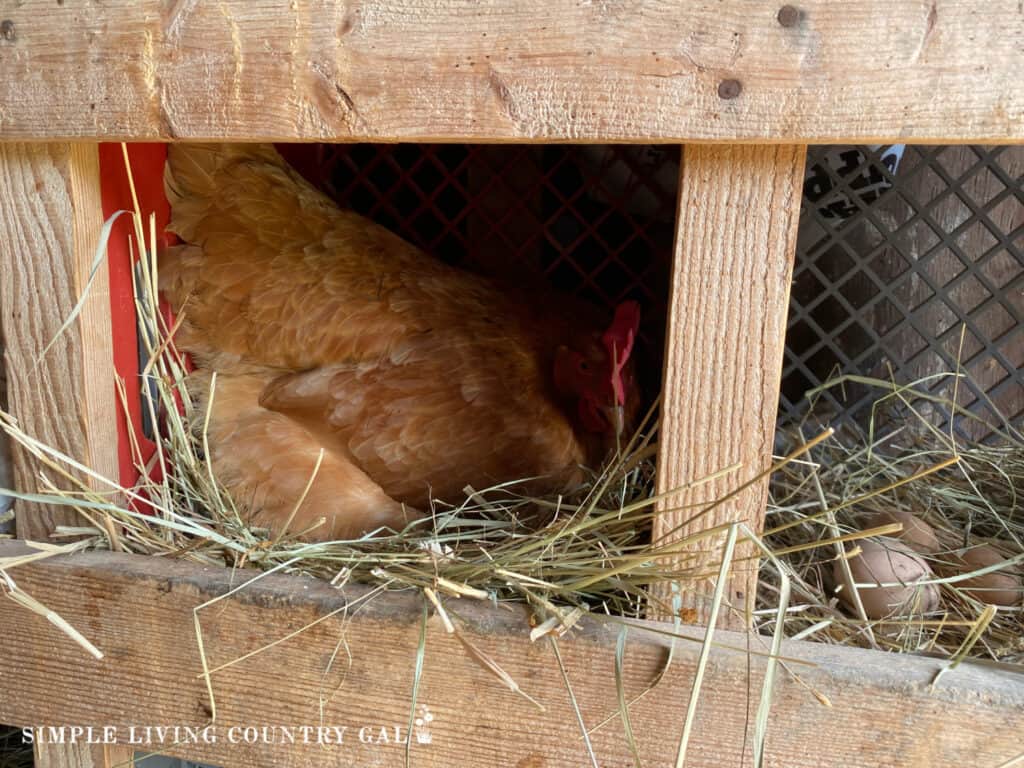
What causes a chicken to become egg bound?
Egg bound, also known as dystocia, can be the result of a few reasons.
- Too much protein in a chicken’s diet
- A poor diet overall
- Stress in the flock
- Continuous laying year round
- A hen that is older
- Calcium deficiency
- Being overweight
- Young chickens with large eggs
- Worms or parasites
- Breed of hen, smaller breeds such as Bantams tend to have a higher occurrence of egg binding.
Symptoms of an Egg-Bound Chicken
There are a few symptoms that a chicken will show when she is egg bound. Knowing them will better help you to recognize there is an issue so you can step in and help more quickly.
Some of these signs are subtle and that is why it is important to “know” your hens so you can better see when something is off.
#1. Behaving differently – Egg-bound chickens may seem lethargic and unable to move around. If you see a hen standing off by herself, that is a clue to investigate.
#2. Hunched – A chicken that is in pain or uncomfortable will look to be hunched over. You may also notice her tail pointing down.
#3. Off food and water – The first clue that something is wrong with your chicken is when they refuse to eat or drink. This will not necessarily mean they are egg bound, but it will mean there is something wrong you will want to look into.
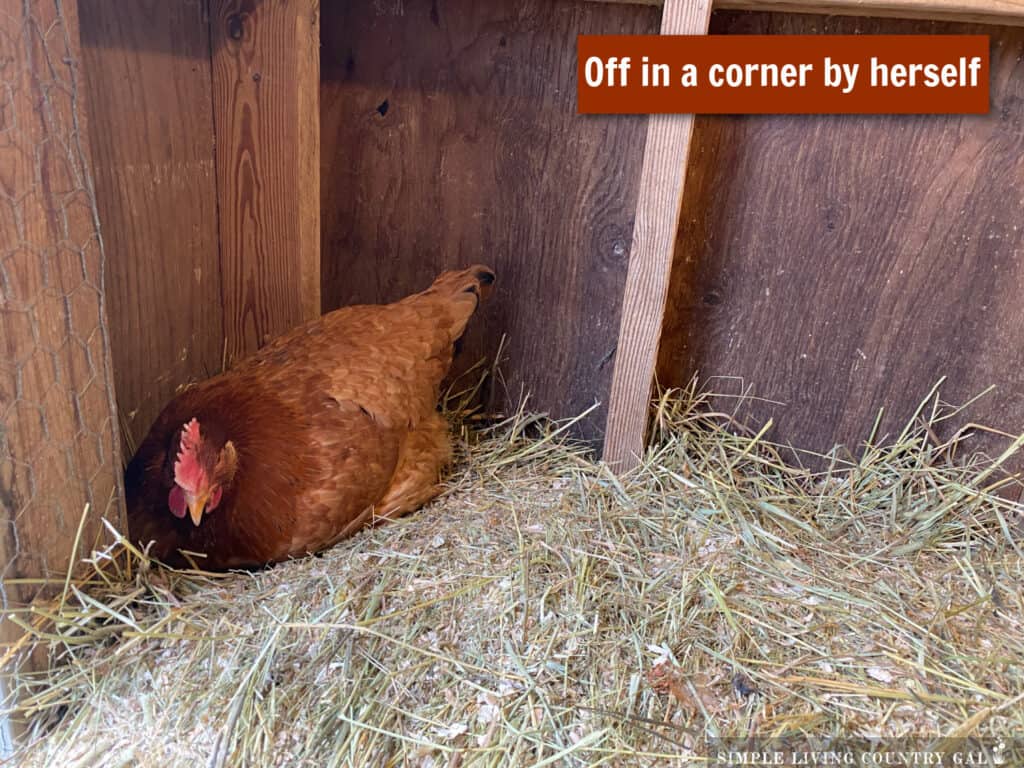
#4. Straining – If you see one of your chickens straining to lay an egg but nothing is happening, there is a chance she may be plugged up. There may also be mucus or blood near her vent.
Please know if your hen has one of these symptoms, it does not mean she is egg bound, but it is a reason to investigate further so you can see if there are any issues you need to assist with.
What to do if your chicken is egg-bound
If you suspect an egg-bound chicken in your flock, there are a few things you can do to help. Please do not leave your hen to resolve the issue on her own; if left untreated, your chicken may not survive. If you are uncomfortable working on your hen, you can call your vet for advice or treatment if they are willing.
It is true that many vets will not treat chickens, but most will help you over the phone. I have called our vet many times for help with our animals, and they are more than willing to walk me through the steps I need to take.
In most cases, you have about 48 hours to help before things get too far along. This is not to scare you, just to let you know that you will want to intervene and act quickly. The good news is that not all egg bindings are a death sentence. Let’s look at a few things you can do to help them pass their egg.
Remember, the only remedy for an egg-bound hen is to get the egg out; all of these tips are meant to be used as supportive care.
Give a Warm Bath
A warm bath will help to relax your chicken so she is better able to pass the egg.
To give your chicken a bath you will need a few supplies.
Supplies:
- Wash tub – Look for one that is large enough to hold your hen. If you don’t have one you can use a plastic tote.
- Warm water
- Epsom Salts – These will help with swelling and help her muscles to relax.
- 1-2 towels – To dry her off after.
Directions:
Step #1. Place your chicken in the warm bath, being sure her vent is submerged. If your chicken puts up a fight, remain calm and wrap your hands around her body to help her feel more secure.
Step #2. Keep her in the bath for 20 minutes.
Step #3. While she is in the water, gently rub her abdomen. Be slow and gentle and use a calm voice to help keep her relaxed.
Step #4. After 20 minutes, remove her from the water and gently blot her dry with a towel. You may need to do this more than once to remove the water.
Step #5. Lubricate her vent by rubbing olive oil, mineral oil, or vaseline around the area with your finger.
Step #6. Put her into a dark and quiet area and give her some time to pass the egg. We like to use a dog crate for our hens and find this works well. If you do not have a crate, you can make one with a large box and some chicken wire.
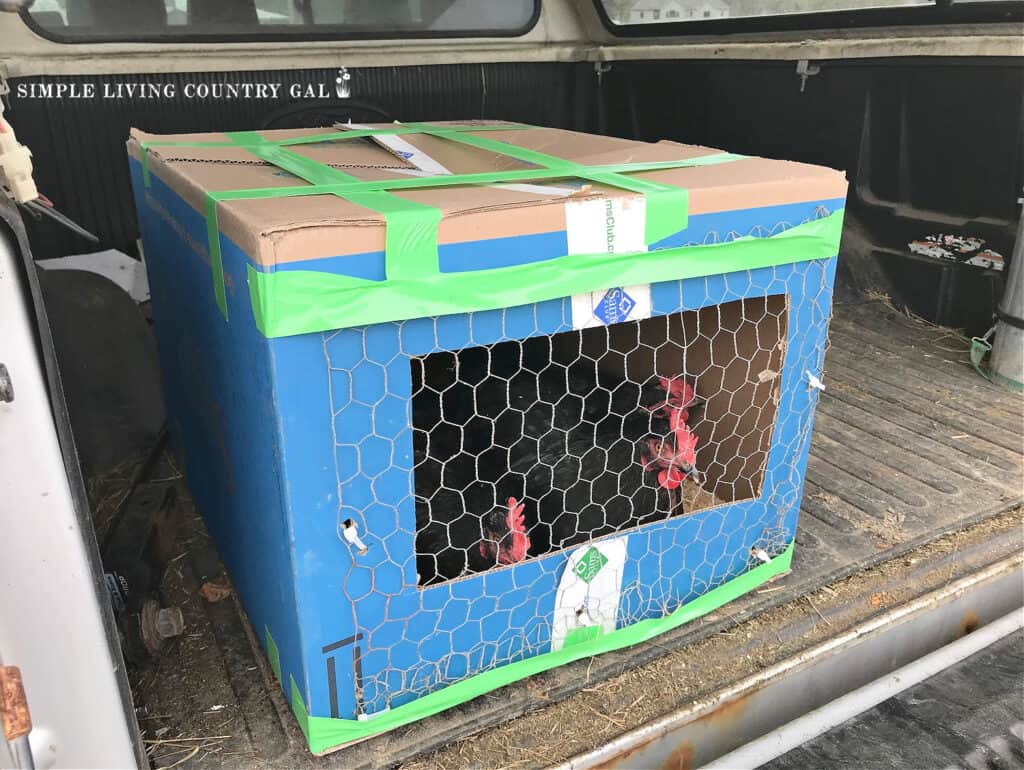
Step #7. If she does not pass her egg, soak her again for another 20 minutes. Repeating steps 1-6 as needed.
If there is no improvement, it may be best to contact a vet. Yes, it’s true many vets will not treat poultry, but most will help you over the phone. If not, you can try calling a neighbor who has chickens themselves to see if they have any advice to give.
Books For Chicken Care
- The Chicken Health Handbook (2nd Edition)
- Raising Chickens for Beginners
- Storey’s Guide to Raising Chickens, 4th Edition
How to prevent chickens from becoming egg-bound
As I mentioned earlier, prevention is always better than having to deal with this stressful situation. These tips will help to prevent your chickens from getting egg-bound.
#1. Ensure that your hens have access to calcium-rich feed, such as oyster shells, which will help strengthen the reproductive system. I like to mix it in with our chicken scratch or in with their regular feed.
#2. Inspect your chickens regularly for worms or parasites.
#3. Watch for hen pecking in your flock, as this can lead to stress in your hens. If you have bullying in your coop you can provide distractions such as fun chicken toys or set up a tomato cage feeder.

#4. Make sure you have more than one source of water and enough feeders for the entire flock to eat without fighting. I like to have a water source in the coop as well as out in the run. This will ensure everyone is staying hydrated.
#5. Monitor your chicken’s laying habits and the size of their eggs. This will help you to notice when there is a drop in eggs, alerting you that there “may” be an issue.
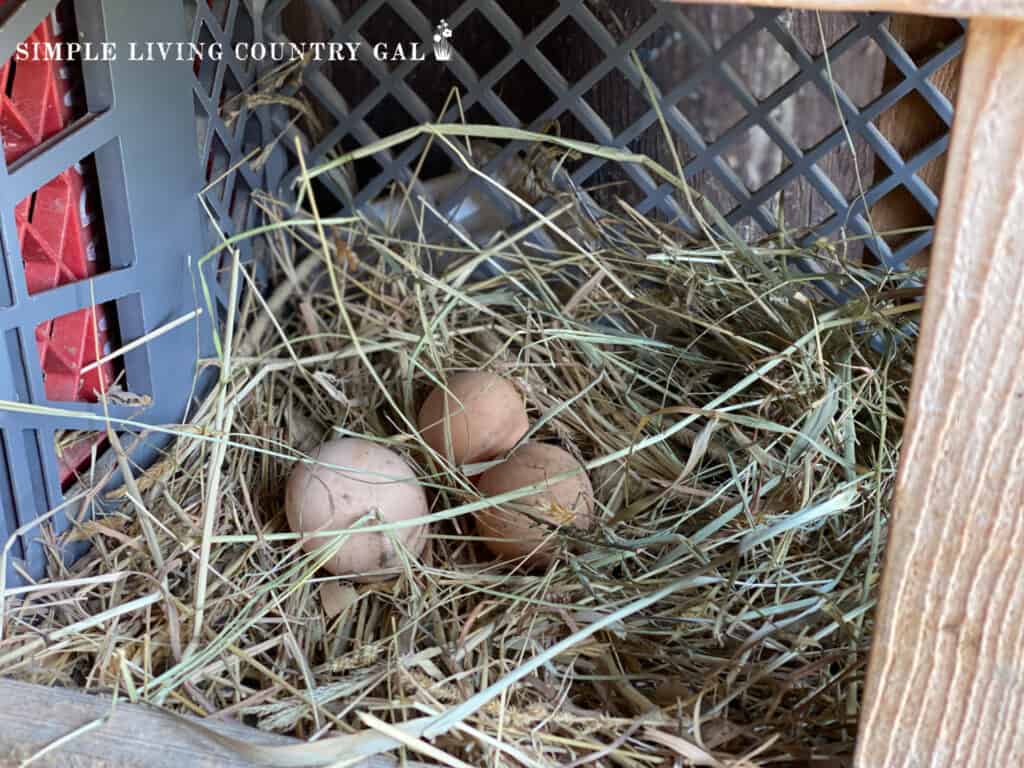
Egg-bound hens are not common in a backyard coop, and in all my years of having chickens, I have never experienced one myself. However, being prepared is a good way to be ready just in case this issue comes up in your own flock.
If you are feeding your flock good grains, ensuring everyone is healthy and hydrated, and you have plenty of room in the coop and the run, you will most likely be fine. Also, hold your hens so you are more familiar with their body condition when they are healthy so you can better catch any issues when they are not.
Bookmark this article so you have a plan just in case one of your hens becomes egg bound.
